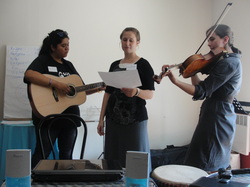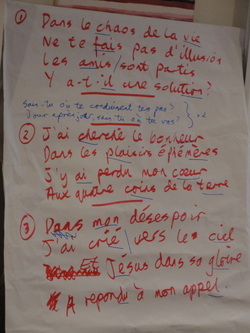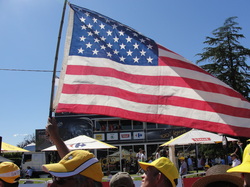 Photo credit: Robert Lawton Photo credit: Robert Lawton Open caskets terrify me. The first one I ever saw was at the funeral of a toddler I babysat for who died suddenly of meningitis. The two-year-old lying in the coffin looked a small child sleeping from a far. When I came closer though, I could see the pasty make-up covering the lifeless face. The bed-jumping, song-singing, wiggling little boy was gone.
The second open casket was the visitation before my grandma's funeral. But it wasn't my grandma I visited. I visited a body, wearing my grandma's clothes, made to look as though she was alive. I don't know what it was about the corpse, but none of us in the family felt like it was her. Maybe it was that she wasn't wearing her glasses. Maybe it was that death had taken the puffiness out of her cheeks. Whatever it was, in that moment, I knew that, while my grandmother's body was still on earth, her spirit had departed. She would never hug me or squeeze my hand like the last time I had seen her alive.
Are you looking alive or fully alive? This was a question posed by pastor and author Alan Kraft at the ReachGlobal Europe conference I attended in Slovenia last month. "Look alive!" is a "cheer" sometimes heard from the stands when the home team is being crushed by the opponent. Often times, ministry teams have the same attitude when morale is down. It's as if by staying busy, we think we can convince ourselves and those around us, that we're doing okay.
However, just as no beautician can fully disguise death, no amount of trying, no amount of good works, no amount of good intentions, can make us fully alive in Christ. In fact, by trying harder, we are putting our confidence in our own ability, in our own flesh and effort, instead of the finished work of Jesus Christ through his death and resurrection. We are in essence believing that we can somehow make ourselves more acceptable to God.
Take a look at The Message paraphrase of Paul's letter to the Philippians, chapter 3:2-9 (emphasis mine):
"Steer clear of the barking dogs, those religious busybodies, all bark and no bite. All they’re interested in is appearances -- knife-happy circumcisers, I call them. The real believers are the ones the Spirit of God leads to work away at this ministry, filling the air with Christ’s praise as we do it. We couldn’t carry this off by our own efforts, and we know it -- even though we can list what many might think are impressive credentials. You know my pedigree: a legitimate birth, circumcised on the eighth day; an Israelite from the elite tribe of Benjamin; a strict and devout adherent to God’s law; a fiery defender of the purity of my religion, even to the point of persecuting the church; a meticulous observer of everything set down in God’s law Book.
The very credentials these people are waving around as something special, I’m tearing up and throwing out with the trash—along with everything else I used to take credit for. And why? Because of Christ. Yes, all the things I once thought were so important are gone from my life. Compared to the high privilege of knowing Christ Jesus as my Master, firsthand, everything I once thought I had going for me is insignificant—dog dung. I’ve dumped it all in the trash so that I could embrace Christ and be embraced by him. I didn’t want some petty, inferior brand of righteousness that comes from keeping a list of rules when I could get the robust kind that comes from trusting Christ--God’s righteousness."
Paul had ever reason to put confidence in his credentials. Yet he considers it all "dog dung" (some might choose an even more "choice" word). Why? Because God's righteousness is so much better. If this were a blind taste test, brand A has nothing on the surpassing flavor of brand B. There is no competition.
All of us at the conference were given a sheet of toilet paper. We were told to write anything and everything on it that was giving us a false sense of spiritual health. We wrote down the behaviors, beliefs and attitudes that we had embraced in our efforts to make sure God still loved us. The next time we had the urge "to go," we were to let our list go with it, down the tubes of the toilet.
It's one thing to flush our own righteousness, but how do we even begin to "embrace Christ and be embraced by him?" In case you are already overwhelmed by the length of this blog post, reflections this answer will come in part two. In the meantime, I urge you to make your own TP list. What are you doing to look alive?
 Imagine that every song in church is a bad translation from Chinese in an Eastern style that you don't know how to sing. The songs use metaphors about rice and chopsticks and the Great Wall of China.
It's not that you haven't accepted the Gospel – you have, but it seems that if you want to worship God, you have to give up everything you know from your culture and follow the lead of foreigners.
Although this is just a hypothetical example, the reality is that many well-intentioned missionaries over the years have imported religion from their home cultures. This is most evident in the use of translated songs in churches across the world.
I remember being in a Lutheran church in Colombia, where an entire hymnal had been translated from English to Spanish. The people sang while accompanied by a piano, but it felt like someone had just superimposed Spanish subtitles on an American worship service. Was the Gospel being preached? Yes. Did the hymns speak truth? Yes. Did the congregants identify with the music they were singing? Not so much.
Compare this to an Ecuadorian church I visited where all the songs were written by Latin American artists in a latin style with their instruments. This church was vibrant and full. The congregants sang loudly and weren't afraid to move a little bit. The lyrics spoke to the heart of the Ecuadorian people.  I attended a music workshop in the Normandy region of France last month which addressed these same issues. We discussed how translated music usually either loses something in translation or loses musicality in preserving the original message.
We made a list of styles of music. Out of about 50 styles, three are being used in our churches. We considered issues that the French face and thematic gaps in worship.
During the second half of the workshop, we chose a style, theme and issue and wrote a song. Pictured left are the lyrics to the Christian reggae song that we wrote.
The song addresses searching for meaning in the midst of hardship. The chorus asks questions. The lyrics are quite poetic and philosophical. We chose not to mention Jesus until the very last verse, so that a non-believer would identify and listen to the song. We did our best to avoid "Christianese" – or words used commonly among in Christian circles – that can often make those on the outside feel excluded. The finished product felt very French.
This fall, our team will be partnering with French and European church planters to see a new church planted in a neighborhood untouched by the Gospel. I am challenged by this conference to seek out French music by French artists to be used in worship – and if there are gaps, to work with French nationals to create songs that the people will sing.
 Photo credit: National Cancer Institute Photo credit: National Cancer Institute French is to bread as American is to _____ ? Hot dog! My focus for much of my first five months here has been language learning. During the poetry unit, I wrote my first poem in French! Our class was asked to imitate the style of French poet, Francis Ponge in his prose poem "Le Pain" (the bread). Here is his poem with an English translation.
We were asked to chose a food that represents our culture, and the hot dog hit the mark for me. Here's my prose poem in French (followed by a rough English translation). Note: some of the plays-on-words don't translate well :(.
Le Hot-dog
La surface du hot-dog est incroyablement limoneuse à cause de certains agents de conservation et de couleur qui donnent l'impression qu'il est mangeable. La forme ressemble plus à un chihuahua que à un type de viande. La longue masse spongieuse de couleur rose, brune ou plutôt rouge cache dans son corps les vies sacrifiées de cochons, de vaches ou de quelque espèce que ce soit. Comme la devise des États-Unis, il est un vrai creuset – la fusion de cœurs, de sabots et de l'occasionnel rein. Son règne n'est pas menacé. Il règne sur les barbecues des Américains à jamais.
The Hot Dog
The surface of the hot dog is incredibly slimy because of certain preservatives and colors that give it the impression that it is edible. His shape looks more like a chihuahua than a type of meat. The long spongy mass of pink, brown or sometimes red hides in his body the sacrificial lives of pigs, cows or whatever other species. Just like the motto of the United States, he is a real melting pot - the fusion of hearts, hooves and the occasional kidney. His reign is not threatened. He will reign over the barbecues of Americans forever.
 Americans are patriotic – even in France. Americans are patriotic – even in France. What does it mean to be patriotic? Is it in outward symbols?
Is it in the waving of flags, in the singing of patriotic songs and national anthems, in wearing national colors, in speaking a language, in having an army, in watching a parade, in setting off fireworks, in celebrating a national holiday?
When I came to France, I assumed it was a very patriotic country. Like the United States, it is a historically powerful country. Many countries were originally colonized by France. There are 33 that claim French as an official language (second only to English, spoken as an official language in 45 countries). Both French and English are taught in every country of the world and spoken on five continents.
While it is true that most French people I have met are proud to claim their nationality and passionate about their language, the manner of expressing this patriotism is displayed much differently. I can't make any assumptions about levels of patriotism in France as compared to the United States. Maybe the age of our countries plays a factor. The oldest city in France, Marseille, dates back to 600 BC. European colonization in the United States didn't begin until 1600, and the country declared its independence from Britain in 1776.
Perhaps, patriotism in France is more of an inward pride rather than an outward display. According to Myers-Briggs research (that test of E/I, N/S, F/T, J/P), American culture is predominantly extroverted thinking whereas French culture is predominately introverted feeling.
I may be an introverted feeler, but I grew up in an extroverted thinking culture. So on July 4, although I didn't want to be too obviously patriotic outside of my home country, I still felt the need to wear red, white and blue (no American flags though) and put fireworks and the Statue of Liberty on my Facebook wall. Friends asked me if I was doing anything to celebrate in France. I don't know that there were many celebrations, but I know there was at least one at the US Embassy (which I wasn't able to attend).
On July 14 (France's national holiday aka Bastille Day), I was prepared to wish all my French friends a "Happy 14th of July," see French flags everywhere and listen to the Marseillaise (the French national anthem) all day long.
Now I did hear the Marseillaise (granted, the first time was during a performance of the 1812 Overture which was written to celebrate victory over France, but the national anthem was still quoted, nevertheless). There were outdoor celebrations, fireworks and parades (traditionally in France there is always a large military parade).
However, most people were not wearing "national" colors, and one French friend was insistent that you shouldn't say anything to wish people a happy national holiday (others later said that it was allowed). In church, we sang no patriotic hymns nor did we pray for the country as we often do in the US. I saw one lone French flag (I'm not sure if it always there or was displayed for the celebration). I heard some French music, but I also heard a great deal of music in English.
I was surprised by this apparent lack of patriotism. But then again, do outward displays say anything about inner allegiance? Does a flag in my hand make me a citizen of a country?
I'm not sure how to measure patriotism. It may be that it's not in flags, patriotic lyrics or in grandiose displays of national pride. Nevertheless, I am challenged being outside of my home culture to really consider what it looks like to be a proud citizen of a country. I am also challenged to rethink what it means to be a citizen of the United States and to represent my country well – at home or away.
|
 Photo credit: Robert Lawton
Photo credit: Robert Lawton 



 RSS Feed
RSS Feed